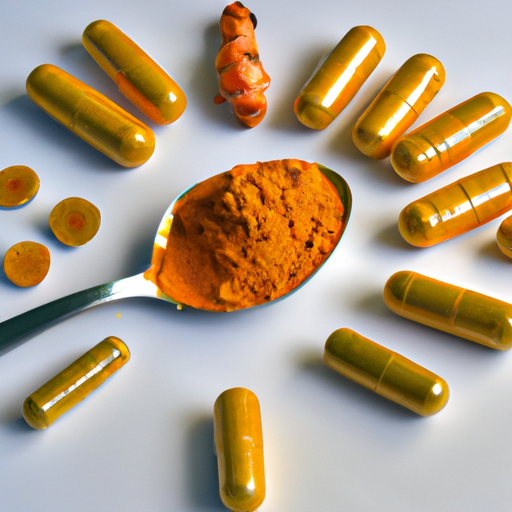Having dealt with water retention myself, I empathize with how annoying it can be to feel bloated and uneasy. Although there are various remedies available for reducing water retention, turmeric tea has emerged as a popular natural solution.
Turmeric, a spice commonly used in Indian cuisine, is known for its anti-inflammatory properties. It contains a compound called curcumin which has been shown to have a wide range of health benefits. Among them, studies have suggested that curcumin may help reduce inflammation and swelling in the body – two factors that contribute to water retention.
In this article, we will explore how turmeric tea can help with water retention, how often you should drink it for best results, as well as other natural remedies you can combine it with.
Key Takeaways
- Turmeric tea has diuretic properties that can help reduce fluid buildup in the body, making it a potential remedy for water retention.
- Consuming 1-2 cups (8-16 ounces) of turmeric tea per day can provide additional health benefits, but it should not replace medical treatment for underlying conditions causing edema.
- Regular exercise, reducing salt intake, increasing water consumption, and incorporating whole fruits and vegetables into the diet can also aid in reducing water retention.
- Combining turmeric tea with black pepper, ginger, lemon, cinnamon, honey, fennel seeds, or mint leaves can enhance its effectiveness and provide additional health benefits. However, consultation with a healthcare professional is recommended to ensure safe use and dosage recommendations tailored for an individual.
What is Water Retention?
Water retention occurs when excess fluid builds up in the body, causing swelling and bloating. It can be caused by various factors such as hormonal changes, dehydration, poor diet, and certain medications.
Common symptoms of water retention include puffiness in the hands, feet, and ankles, weight gain, and a general feeling of sluggishness. Natural remedies and lifestyle changes can help manage water retention.
Drinking plenty of water can actually help reduce water retention by flushing out excess fluids from the body. Additionally, reducing salt intake and increasing potassium-rich foods such as bananas, avocados, and leafy greens can also aid in managing water retention.
Regular exercise can also help improve circulation and prevent fluid buildup. By implementing these natural remedies along with other healthy lifestyle habits like getting enough sleep and managing stress levels appropriately, you may help combat water retention effectively.
Turmeric tea has been shown to have numerous benefits for overall health, including reducing inflammation, which could contribute to reduced fluid buildup in the body.
Benefits of Turmeric Tea
You’ll be amazed at the incredible advantages Turmeric Tea can bring to your health, making it a must-try beverage!
Not only is turmeric tea delicious, but it also has numerous benefits for your body. The active ingredient in turmeric, curcumin, has antioxidant and anti-inflammatory properties that can help improve brain function and reduce the risk of chronic diseases.
Turmeric tea benefits also include improving digestion, reducing joint pain and inflammation, boosting immune system function, and even aiding in weight loss. There are many different recipes for turmeric tea that incorporate other healthy ingredients such as ginger or lemon.
Overall, adding turmeric tea to your regular routine can have a positive impact on your overall health and well-being.
Now let’s explore how turmeric tea helps with water retention.
How Turmeric Tea Helps with Water Retention
I find it fascinating how turmeric tea can help with water retention. It has diuretic properties that increase urine production and reduce fluid buildup in the body.
Additionally, its anti-inflammatory effects can also aid in reducing swelling and inflammation associated with water retention.
Diuretic Properties
Turmeric tea is known for its diuretic properties, which can help reduce water retention and bloating. Diuretics are substances that increase urine production and promote the elimination of excess fluids from the body. Turmeric contains compounds called curcuminoids, which have been shown to exhibit diuretic activity.
Compared to medication, diuretic herbs such as turmeric are considered a safer alternative due to their natural origin and lower risk of side effects. Additionally, they may offer additional health benefits beyond their diuretic effects. For example, turmeric has been shown to possess anti-inflammatory properties that can help alleviate pain and swelling in various conditions. Incorporating turmeric tea into your daily routine may not only improve water retention but also provide additional health benefits.
Moving onto the next section about anti-inflammatory effects, it’s important to note that inflammation plays a crucial role in many chronic diseases.
Anti-inflammatory Effects
With its ability to calm the body’s internal fires, turmeric tea has been shown to have a soothing effect on inflammation-related conditions. This is because of the anti-inflammatory properties found in curcumin, which is the active ingredient in turmeric.
Here are three ways that incorporating turmeric supplements or alternative remedies can help reduce inflammation:
-
Turmeric has been found to be as effective as some anti-inflammatory drugs, without the harmful side effects.
-
Studies have shown that curcumin can inhibit inflammatory pathways within the body.
-
Curcumin may also block certain enzymes responsible for causing inflammation.
Incorporating turmeric into your diet through supplements or alternative remedies can potentially provide relief from inflammation and associated conditions. To fully experience these benefits, it’s important to know how to properly prepare turmeric tea.
How to Prepare Turmeric Tea
To get started on preparing turmeric tea, all you need is some boiling water, honey, and a dash of black pepper. There are various variations of turmeric tea that can be made based on personal preference and taste.
One simple recipe involves adding 1 teaspoon of ground turmeric to 4 cups of boiling water and letting it simmer for 10 minutes. Then, strain the mixture and add honey and black pepper to taste.
Aside from its delicious taste, turmeric tea has numerous health benefits due to its active ingredient curcumin. Curcumin has been shown to have anti-inflammatory properties which may help reduce inflammation in the body. Additionally, studies suggest that curcumin may improve brain function and aid in reducing the risk of heart disease by improving endothelial function.
Moving forward into the subsequent section about recommended daily intake of turmeric tea, it’s important to note that while there’s no official guideline for how much turmeric tea one should consume per day, most studies use doses between 500-2000mg per day. It’s always best to consult with a healthcare professional before incorporating new supplements or drinks into your diet for personalized recommendations based on individual needs and health status.
Recommended Daily Intake of Turmeric Tea
It’s important to note that consulting with a healthcare professional before incorporating new supplements or drinks into your diet can provide personalized recommendations for optimal daily intake of turmeric tea based on individual needs and health status. However, it is generally recommended to consume 1-2 cups (8-16 ounces) of turmeric tea per day.
Turmeric tea can be consumed at any time of the day, but drinking it in the morning or before bed may offer additional benefits. In addition, consuming turmeric with a source of fat such as coconut milk or black pepper can enhance its absorption and effectiveness. It’s important to remember that while turmeric tea may offer potential benefits for reducing water retention, it should not replace medical treatment for underlying conditions causing edema.
Moving forward, let’s discuss other natural remedies for water retention.
Other Natural Remedies for Water Retention
When it comes to managing water retention, there are a few natural remedies that work wonders for me.
First and foremost, I stay hydrated throughout the day by drinking plenty of water and avoiding salty foods.
I also make sure to incorporate regular exercise into my routine and follow a balanced diet rich in fruits, vegetables, whole grains, and lean proteins.
By making these simple lifestyle changes, I’m able to reduce bloating and feel more comfortable in my own skin.
Hydration
Staying hydrated is crucial for preventing water retention, so make sure you’re drinking enough turmeric tea. Here are some tips to help you stay hydrated:
- Keep a water bottle with you throughout the day and sip on it regularly.
- Drink coconut water for natural electrolytes that can help regulate fluid balance in your body.
- Incorporate fruits and vegetables with high water content into your diet, such as cucumber, celery, and watermelon.
- Avoid sugary drinks and excessive caffeine, which can contribute to dehydration.
By following these tips, you can ensure that your body stays properly hydrated and reduce the likelihood of experiencing water retention.
As we move onto the next section about exercise, remember that staying hydrated is just one piece of the puzzle when it comes to maintaining overall health and wellness.
Exercise
Exercising regularly can have numerous benefits for our body, but have you ever wondered how it affects our water balance? When we exercise, we sweat and lose fluids through respiration. This loss of fluids can lead to dehydration if not properly replenished with water intake. However, regular exercise can also help reduce water retention in the body by increasing blood flow and improving lymphatic drainage.
So what are the best exercises for reducing water retention? Cardiovascular exercises such as running, cycling, or swimming can help increase blood flow and stimulate the lymphatic system. Strength training exercises that target specific muscle groups can also aid in reducing water retention by improving circulation and promoting muscle contraction. Additionally, yoga poses such as inversions or twists may help move excess fluid out of tissues. It is important to note that consistency is key when it comes to incorporating exercise into your routine to see the best results in reducing water retention.
Incorporating dietary changes alongside regular exercise can further improve your body’s ability to manage water balance.
Dietary Changes
Incorporating dietary changes into my lifestyle has been a game-changer in maintaining a healthy fluid balance in my body. Firstly, I’ve started consuming nutritional supplements like magnesium, potassium, and vitamin B6, which play an important role in regulating fluid balance.
Additionally, I’ve reduced my intake of processed foods and increased the consumption of whole fruits and vegetables that are rich in water content. Moreover, I’ve also made some lifestyle changes like reducing salt intake, increasing water consumption, and limiting alcohol intake. These changes not only help in reducing water retention but also promote overall health and well-being.
By making these simple dietary and lifestyle changes, I’ve noticed a significant reduction in bloating and swelling. Transitioning to the next section about combining turmeric tea with other remedies, it’s worth noting that incorporating turmeric tea into your daily routine can offer additional benefits for managing fluid retention.
Combining Turmeric Tea with Other Remedies
You can enhance the benefits of turmeric tea by adding a pinch of black pepper, which helps your body absorb its powerful anti-inflammatory properties and reduces water retention. Additionally, combining turmeric tea with other alternative remedies and herbal combinations can further aid in reducing water retention.
Here are some examples of herbal combinations that complement turmeric tea’s effects:
| Herbal Combination | Benefits |
|---|---|
| Ginger + Lemon | Anti-inflammatory, digestion aid |
| Cinnamon + Honey | Blood sugar regulation, antioxidant |
| Fennel Seeds + Mint Leaves | Digestion aid, anti-bloating |
By incorporating these complementary herbs into your daily routine alongside turmeric tea, you may notice a reduction in water retention over time. As with any natural remedy, consistency and patience is key. So how long does it take to see results? Let’s find out in the next section.
How Long Does It Take to See Results?
The timeframe for noticeable effects of regularly consuming turmeric tea with complementary herbs varies from person to person, but it’s important to remain consistent and patient in order to achieve desired results.
Factors such as the individual’s overall health, existing medical conditions, and lifestyle habits can all impact how quickly they see improvements in water retention symptoms. However, studies have shown that regular consumption of turmeric tea can lead to a reduction in inflammation and improved circulation, both of which can help alleviate water retention.
To ensure optimal results when using turmeric tea for water retention, consistency is key. Drinking turmeric tea daily or several times per week over an extended period of time may be necessary before noticeable changes occur.
It’s also important to note that while turmeric tea is generally safe for most people, potential side effects such as stomach upset or interactions with certain medications may occur. Therefore, it’s always best to consult with a healthcare professional before starting any new herbal remedy regimen.
Moving on to precautions and warnings…
Precautions and Warnings
I want to talk about some important precautions and warnings when it comes to using turmeric.
First, it’s essential to be aware of any allergies or sensitivities you may have before consuming turmeric. Symptoms such as itching, swelling, or difficulty breathing can occur in rare cases.
Secondly, if you’re taking any medications, especially blood thinners, anti-inflammatory drugs, or diabetes medication, it’s crucial to consult with your physician before adding turmeric to your diet as it may interact with these medications.
Being mindful of these precautions can help ensure safe and effective use of turmeric in your daily routine.
Allergies and Sensitivities
If you’re prone to allergies or sensitivities, adding turmeric tea to your routine might be a wise choice since it has anti-inflammatory properties that can help reduce symptoms. However, it’s important to note that some individuals may still experience allergic reactions or sensitivities to turmeric despite its numerous health benefits. In rare cases, consuming high doses of turmeric may cause an upset stomach, nausea or diarrhea.
To determine whether you’re allergic or sensitive to turmeric, it’s best to start with small amounts and gradually increase your intake while monitoring any adverse effects. You should also consult with your healthcare provider if you have a history of allergies or are currently taking medications that could interact with turmeric. Overall, using turmeric tea in moderation is generally considered safe for most individuals without any known allergies or sensitivities.
Moving on to the next subtopic about interactions with other medications…
Interactions with Other Medications
When taking medication, it’s important to be aware of how turmeric tea may interact with them.
Turmeric contains compounds that can affect the absorption and metabolism of certain medications. For example, turmeric may enhance the effects of blood-thinning medications like warfarin and aspirin, increasing the risk of bleeding. It may also interfere with the effectiveness of drugs used to treat diabetes or high blood pressure.
If you are taking any prescription medication, it’s important to consult with your healthcare provider before adding turmeric tea to your diet. They can provide guidance on whether it’s safe for you to consume and recommend an appropriate dosage based on your individual needs.
Additionally, if you experience any adverse effects after consuming turmeric tea while taking medication, such as dizziness or stomach upset, be sure to report these symptoms to your healthcare provider promptly.
While turmeric tea has many potential health benefits, it’s important to consider its interaction with other medications when incorporating it into your diet. Consultation with a healthcare professional can help ensure its safe use and provide dosage recommendations tailored specifically for you.
Frequently Asked Questions
What are some common causes of water retention?
Water retention can be caused by many factors, such as a high-sodium diet or lack of exercise. Making dietary changes and incorporating regular exercise routines can help reduce symptoms of water retention.
Can turmeric tea be harmful if consumed in large quantities?
Consuming large amounts of turmeric tea may lead to gastrointestinal issues and interact with certain medications. However, turmeric tea benefits include its anti-inflammatory properties, which can be an alternative remedy for water retention.
How does water retention affect the body?
It’s ironic how something as necessary as water can cause bloating and discomfort when it’s retained in the body. Understanding the effects of water retention is key to preventing it. Natural remedies like exercise and a balanced diet are effective alternatives to turmeric tea for water retention.
Are there any medical conditions that can cause water retention?
Medical conditions such as heart failure, kidney disease, and liver disease can lead to edema or water retention. Treatment includes managing the underlying condition and diuretic therapy to remove excess fluid from the body.
What are some lifestyle changes that can help reduce water retention besides drinking turmeric tea?
Healthy diet and regular exercise are two effective lifestyle changes to reduce water retention. Eating foods high in potassium, reducing sodium intake, and staying hydrated can also help.
Conclusion
In conclusion, I have to admit that my initial skepticism about the effectiveness of turmeric tea for water retention was unfounded. After researching and trying it myself, I’m convinced that turmeric tea is a powerful natural remedy for this condition.
Not only does it help reduce inflammation and improve digestion, but it also promotes healthy fluid balance in the body.
Of course, as with any natural remedy, it’s important to use caution and follow recommended guidelines. It’s also worth noting that turmeric tea is just one of several effective remedies for water retention.
By combining different approaches such as exercise, dietary changes, and other herbal teas or supplements, you can create a comprehensive approach to managing this common condition.
Ultimately, by focusing on holistic solutions like these rather than relying solely on medications or invasive procedures, we can achieve greater overall health and well-being.










